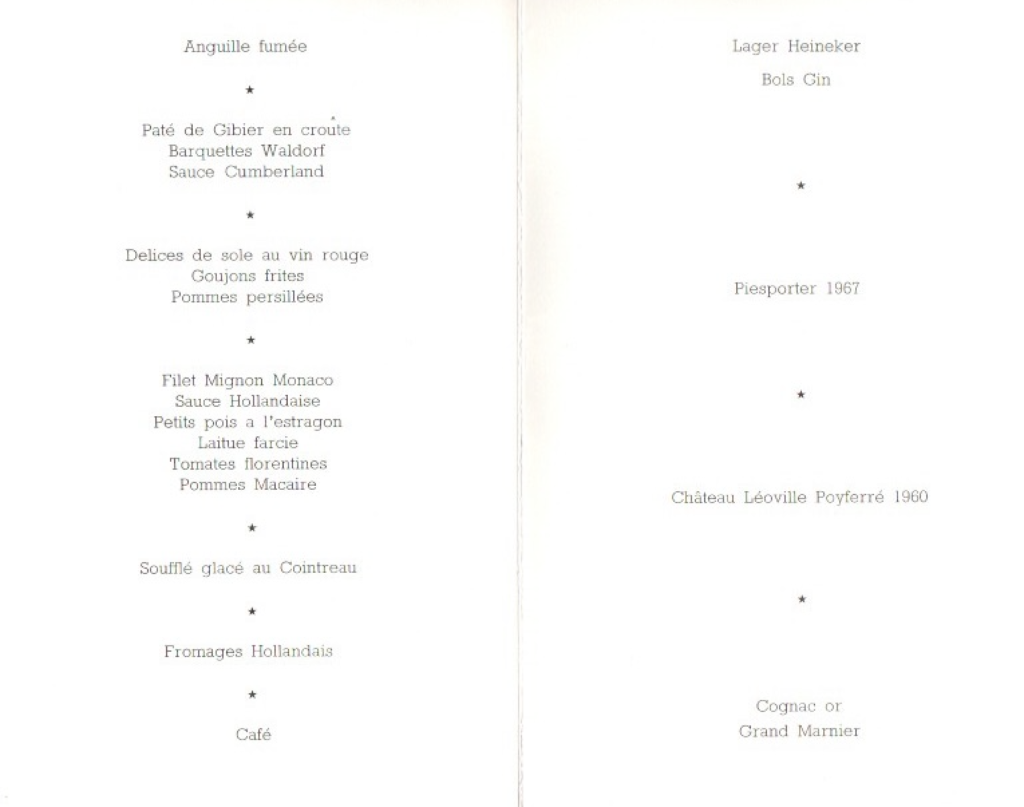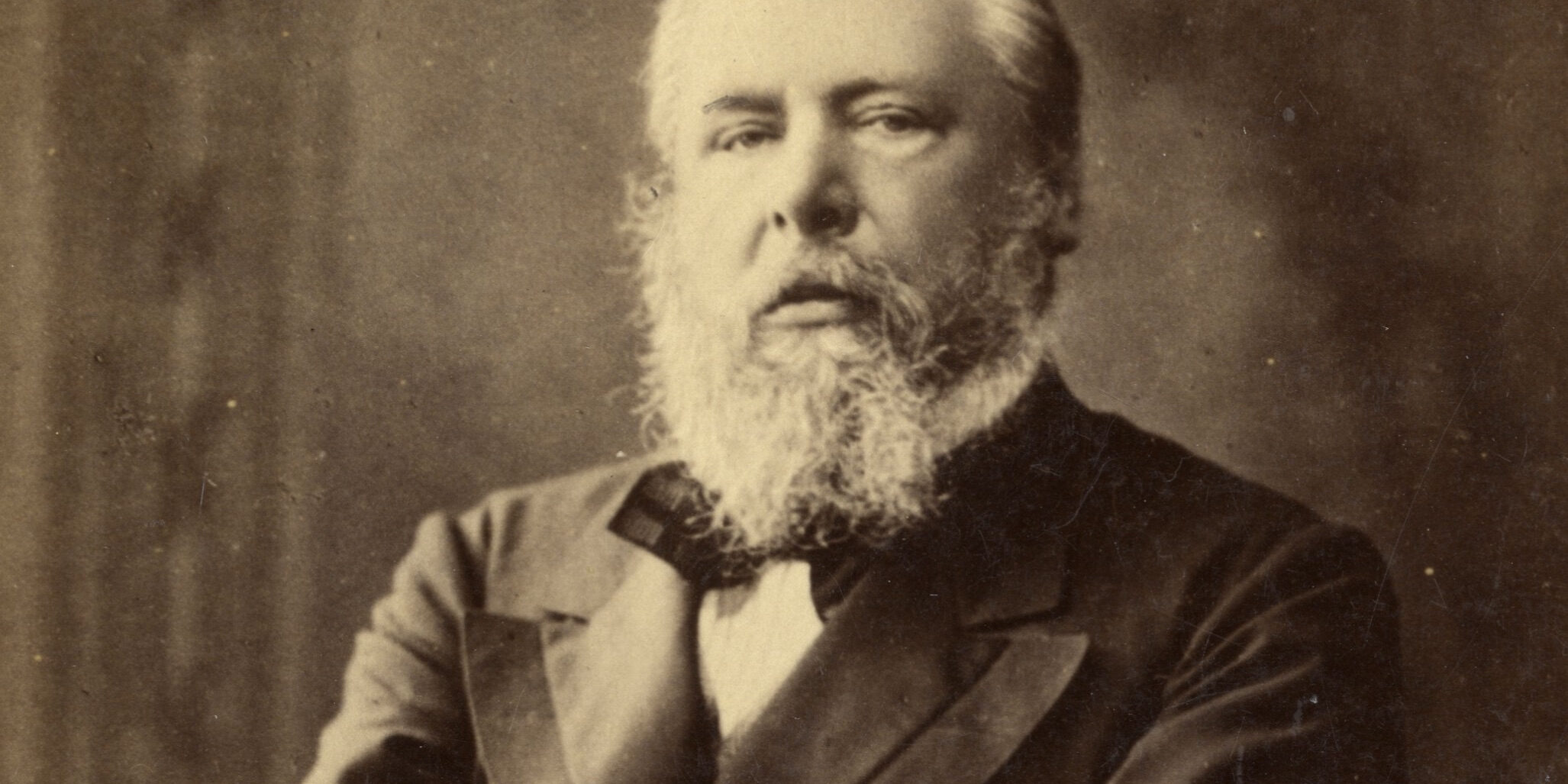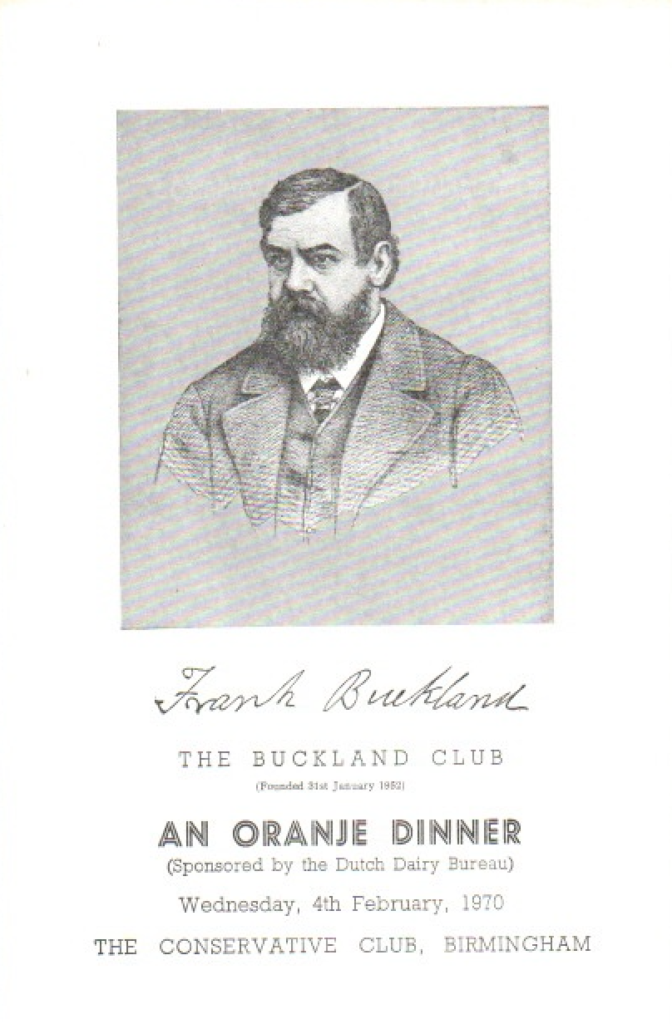Date: Wednesday 4th February 1970
Venue: The Conservative Club, Birmingham
Sponsor: Mr. van Haeften
Dinner Minutes – An Oranje Dinner
An Oranje Dinner was held on Wednesday, the 4th of February, 1970 at The Conservative Club, Birmingham, sponsored by Mr. van Haeften of the Dutch Dairy Bureau and Colonel Geoffrey Grey, the Consul for the Netherlands in Birmingham.
Before proceeding to dinner Mr. van Haeften explained that the menu was in fact a rather simplified form of a birthday banquet served to King William the Third of Holland on the 19th of February 1868 and that as the Dutch family were of the House of Orange it was appropriate that the dinner should be “An Oranje Dinner”. Mr. van Haeften spoke of the close connection between Holland and England and the early attempt to get England into the Common Market when a William of Orange married an English Queen. He also made an unguarded reference to a certain Admiral van Tromp and a broom but as a loyal subject of the Queen and as a one-time temporary acting naval officer, I have exercised the Secretary’s privilege to omit this reference from the minutes.
We were told that the banquet to King William ran to some eleven courses and was considered rather large for a present-day meal and so a modified menu had been sorted out for the Club by a very famous Dutch chef, Mr. Heering.
It is customary for the Club Minutes to take the form of a course by course, or should I rather say a round by round, commentary on the menu but I feel that future generations of members would not fully appreciate the endurance test which is imposed by a full meal straight from the Netherlands unless the menu were copied in its entirety as a single unit.
We were given: –
Anguille Fumée
-o0o
Paté de Gibier en Croûte
Barquettes Waldorf
Sauce Cumberland
-o0o-
Delices de Sole au Vin Rouge
Goujons Frites
Pommes Persillées
-o0o-
Filet Mignon Monaco
Sauce Hollandaise
Petits Pois a l’Estragon
Laitue Farcie
Tomates Florentines
Pommes Macaire
-o0o-
Souffle Glacé au Cointreau
Before the meal we had very adequate “bits and pieces” and drank LAGER HEINEKER and BOLS GIN. With the meal we had PIESPORTER 1967, CHATEAU LÉOVILLE POYFERRÉ 1960, COGNAC and GRAND MARNIER.
From the above it is understandable that Colonel Grey found himself in some difficulty, not as to quality but as to quantity, in that they had had a trial run a week previously from which he declared he had not yet fully recovered, but the helpings for our dinner had been substantially reduced.
The “SMOKED EELS” had been imported from Holland by ColonelGrey at his own expense and were, it was agreed by both our Sponsors, perhaps – the most typical and wholly Dutch of all our dishes. Colonel Grey was quick to point out that they were the small Dutch eels and not the large coarse variety which he usually called “conger” and which he understood were often imported frozen from Turkey. The little fillets with which we were served were excellent.
THE PATÉ contained pork, chicken, chicken liver, wild meat, all stewed separately with bay leaves and thyme. This was sieved, mixed with egg yolks, madeira jelly, brandy and truffles and baked for an hour.
THE BARQUETTES WALDORF were puff pastry boats filled with a Waldorf salad containing strips of celery and apple dressed with double cream and lemon juice, mixed with walnut, and wrapped in thin slices of ham. THE SAUCE CUMBERLAND, Colonel Grey said needed no introduction but that served that night had been made with Beaujolais, red-currant jelly, whole blackberries, ground ginger, French mustard, lemon and orange juice with the peel of both. It will be seen that there were two fish in the fish course, the FILET OF SOLE was poached in red wine, a little chopped onion and peppercorns, with the wine stock boiled down and thickened in melted butter.
THE GOUJONS Colonel Grey said had caused him some difficulty. Apparently the instructions from the Netherlands were ”Goujons, or Gudgeons, are very tiny long round fishes and seldom to get, inhabiting as they do inaccessible corners of the North Sea”. Apparently white bait are accepted as a satisfactory alternative and we ate these deep fried with breadcrumbs. Just to make sure we did not go hungry we were given PARSLEY POTATOES.
There was some substance about the main course, FILET MEGNON – MONACO. Tournedos are very much a DUTCH speciality and there was something very special about the size of ours. They were cooked normally and served on a bread crouton, topped with a thin slice of Parma ham fried in butter, fried chopped mushrooms and served with a madeira sauce and thin sliced truffles. There were the normal accompaniments of PETITS POIS and TOMATES FLORENTINE but again, to take the edge off our appetite, there were POMMES MACAIRE, potatoes cooked in their jackets, the insides removed, seasoned, and then rolled and fried in butter and LAITUES FARCIES, which would have made a substantial and excellent supper dish on their own. These are cooked whole lettuce heads, out in half, stalks removed then filled with minced beef, pork, egg yolk, breadcrumbs, spices, seasoning and surrounded by thin slices of bacon before baking in the oven and served with SAUCE HOLLANDAISE.
Colonel Grey was a little worried about SOUFFLÉ GLACE but there is no reason why he should have been; It was an excellent mixture of egg yolks, sugar and Cointreau folded into whipped cream inside a waxed paper and frozen.
Mr. van Haeften lead us through an interesting summary of the Dutch cheeses for which that country is so famous, but it was interesting to note his comment that whereas there were many good farmers’ cheeses made in England none of the cheeses that he had to offer were “farmers’ cheese”. There was the GOUDA, a large wheel shaped cheese very useful in cooking and preferred in Holland when mature and harder. The small EDAM cheese round and dipped in red wax for export purposes only was excellent for slimming as it had a low fat and high protein content. The BLUFORT CHEESE made from full cream milk, with a mould producing culture “penicillium roquefort”. A soft KERNHEM cheese, developed more recently from a very old North Holland recipe and LEIDEN cheese, which is fairly dry and similar to Gouda but with carraway seeds.
Mr. van Haeften’s comment upon after dinner drinks was that there were very few real Dutch ones, in the same way that there were not very many entirely Dutch dishes. He could only quote Creme de Caceo which was not only very nasty but had also been described as a prostitute’s drink, therefore that night we were drinking GRAND MARNIER and COGNAC.
The Chairman thanked both Mr. van Haeften and Colonel Grey for their care in selection and presentation of the dinner. It was clear that a very great deal of hard work had been put into it and each dish was something which the members will no doubt remember and hope to have again.

It is perhaps appropriate to conclude these Minutes with the following two verses which were passed to me at the end of the meal; written on the place card of one of our senior members: –
“In matters of commerce the fault of the Dutch
Is giving too little and charging too much;
The French are with moderate profit content
So we clap on Dutch bottoms just 20 per cent.”
Canning.
” In matters of dining the fault of the Dutch
Is serving not ample but far, far too much;
Your Bucklands with moderate intake content
The Oranje defeats them by 90 per cent.”
R.E.T.
There were present at the dinner 50 Members and 2 Guests as follows: –
G. Austin, G. H. Bartleet, F. Bell-Scott, E. F. Briscoe, Sir Charles Burman, LHargreaves Beare, H. L. Barman, W. J. Bate, N. Crab‘rree, P. R. Connolly, C. L. Chatwin, W. R. Doherty, J. P. Eames, O. E. Fowler, P. J. Feeny, O. Hahn, N. Hawkes, P. C. Hordern, H. Huntington-Whiteley, P. A. Hopkins, A. C. Houghton, R. Hodgkinson, A. Innes, R. S. King-Farlow (Chairman), S. V. Lancaster, M. V. Manzoni, J. M. Malins, E. H. Moore, R. E. Moore, J. Manson, H. G. V. Milward, Sir Herbert Manzoni, C. P. Norbury, P. A. G. Osler, J. Osborne, S. P. S. Oswald, J. B. Parker, F. E. Pardoe, O. Hood Phillips, E. S. Russell, E. V. Ralph, G. Scott-Atkinson, T. J. R. Spencer, R. E. Threlfall, G. C. Trentham, Sir Arthur Thompson, J. P. H. Walker, J. N. Wharton, S. T. Walker, and R. N. Wadsworth.







